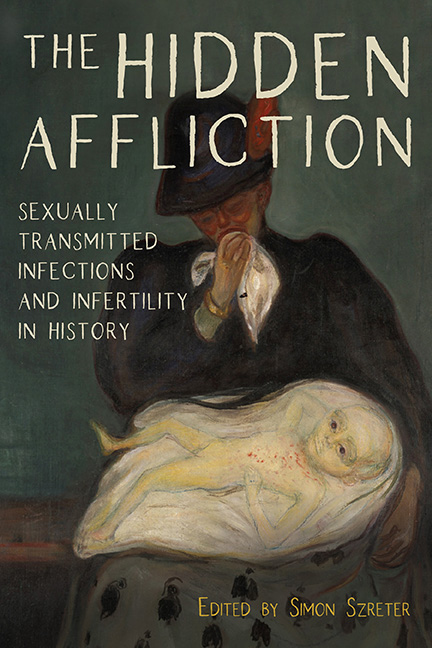Book contents
- Frontmatter
- Contents
- Acknowledgments
- Introduction
- Part One The Hidden Pitfalls in the Early Documentary Record
- Part Two The Biomedical Sciences and the History of the STI Microorganisms
- Part Three Population Decline in the Global South
- Part Four Infertility and the Specter of Venereal Diseases in Modern Europe
- 10 “The Archenemy of Fertility”: Gonorrhea and Infertility, Germany 1870–1935
- 11 Fecundity in a World of Scourges: Venereal Diseases, Criminal Abortion, and Acquired Infertility in France, circa 1880–1950
- 12 Revealing the Hidden Affliction: How Much Infertility Was Due to Venereal Disease in England and Wales on the Eve of the Great War?
- List of Contributors
- Index
12 - Revealing the Hidden Affliction: How Much Infertility Was Due to Venereal Disease in England and Wales on the Eve of the Great War?
from Part Four - Infertility and the Specter of Venereal Diseases in Modern Europe
Published online by Cambridge University Press: 25 March 2020
- Frontmatter
- Contents
- Acknowledgments
- Introduction
- Part One The Hidden Pitfalls in the Early Documentary Record
- Part Two The Biomedical Sciences and the History of the STI Microorganisms
- Part Three Population Decline in the Global South
- Part Four Infertility and the Specter of Venereal Diseases in Modern Europe
- 10 “The Archenemy of Fertility”: Gonorrhea and Infertility, Germany 1870–1935
- 11 Fecundity in a World of Scourges: Venereal Diseases, Criminal Abortion, and Acquired Infertility in France, circa 1880–1950
- 12 Revealing the Hidden Affliction: How Much Infertility Was Due to Venereal Disease in England and Wales on the Eve of the Great War?
- List of Contributors
- Index
Summary
The Decline of a Nation?
By the turn of the twentieth century the British nation's declining birthrate was increasingly the subject of anxious public and scientific debate, as the Registrar General's annual reports continued to confirm a downward national trend, which had in fact commenced from the late 1870s. The secularist Malthusian League had positively promoted birth control, and now economists and eugenicists, feminists and Fabians, as well as leading figures in the church and in the medical profession, all agreed that this was a momentous matter. Previously, human fecundity—the capacity to conceive and reproduce—had not been considered a significant social variable. While the fertility of individuals or couples might be subject to some variation, with the odd exception populations and nations had dependably high fertility. Since Malthus—and even more so since Darwin's generalization of Malthus's proposition to all species—it was an accepted fact that nature was fecund to a fault. Fertility was too robust, not too frail. Consequently, one of the eternal human predicaments, both for the individual and for government, was how to rein in this exuberant fertility. So the dawning perception of the nation's flagging and apparently fragile vitality—and indeed that of several other urbanizing nations, too—was a serious shock, expressed not just in politics but also science and literature.
The three decades before the outbreak of the Great War therefore saw an intensification of attention to the newly problematized issue of human fertility. Many competing theses and theories were advanced and publicly aired to account for the challenging new phenomenon. The diversity of speculation during these decades was fed by the rapidly changing state of both pure and applied knowledge within the biological and the medical sciences, concerning both evolutionary theory and germ theory. Simultaneously, fraught social and political debates over sex and gender norms were intensifying into the crescendo of the militant suffragette campaign, which also raised the temperature further with the issue of infection of innocent wives by their sexually irresponsible male partners.
- Type
- Chapter
- Information
- The Hidden AfflictionSexually Transmitted Infections and Infertility in History, pp. 373 - 419Publisher: Boydell & BrewerPrint publication year: 2019

